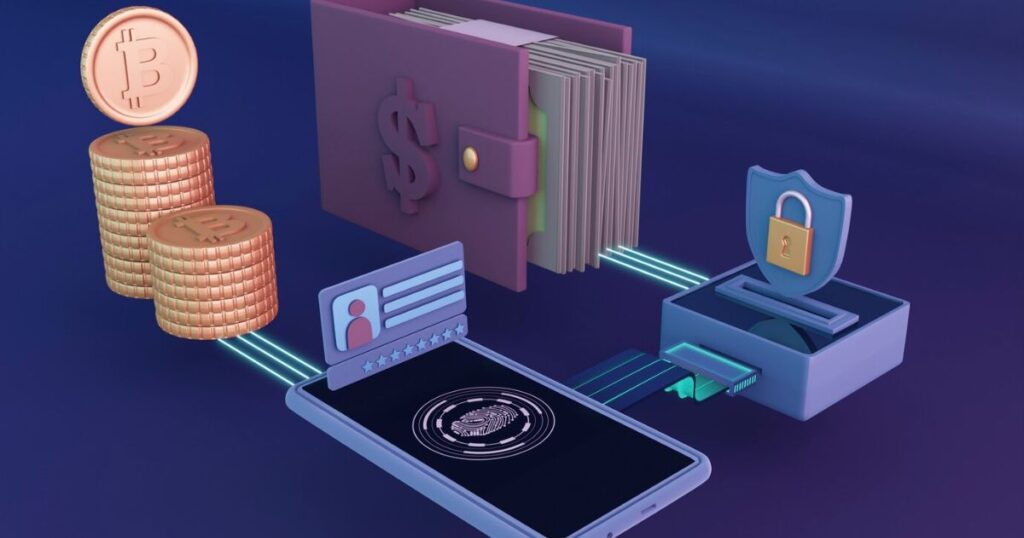Blockchain emerged as the core foundation for Bitcoin before becoming a disruptive technology that revolutionizes sectors such as finance along with healthcare and supply chains and additional business operations. Blockchain technology builds digital economy trust through enhanced security features in addition to removing third-party systems.
The exploration of blockchain by business entities and governmental organizations has led to a decentralized future because customers now maintain authority over their possessions along with their personal information and money transfer records. The technology extends beyond cryptocurrency because it will generate a new digital era that establishes transparency alongside security and efficient interactions between global users online.
The Role of Blockchain in Financial Services

The financial sector undergoes transformation through blockchain because it speeds up secured transactions that cost less. Financial institutions alongside central banks evaluate Central Bank Digital Currency systems (CBDCs) as a modernization step for the financial operating environment.
The financial revolution which enables individuals and businesses internationally gains power through blockchain technology because of its enhanced transparency and fraud reduction capabilities. The ability of blockchain to prevent counterfeiting and fraud enables the food and pharmaceutical sectors and luxury industry to achieve benefits.
Blockchain and Supply Chain Transparency

The most exciting business use of blockchain technology exists in managing supply chains. Through blockchain technology companies achieve three capabilities: they verify product authenticity as well as enable real-time tracking of shipments and ensure ethical sourcing.
The ability of blockchain to prevent counterfeiting and fraud enables the food and pharmaceutical sectors and luxury industry to achieve benefits.
The Intersection of Blockchain and Cybersecurity

Data protection receives an enhanced robust solution through blockchain technology due to the increasing number of cybersecurity threats within our digital age. Because blockchain operates as a decentralized system it creates data protection that traditional centralized systems lack because attacks from cybercriminals become more difficult.
Transactions become secure by using encryption technologies that verification mechanisms based on consensus protect with integrity. The blockchain technology has started its path while demonstrating endless possible applications.
Blockchain’s Impact on Healthcare and Data Privacy
Current healthcare operations benefit from blockchain as it strengthens data protection while creating smooth information exchange and gives patients complete access to their medical records. Patients can authorize access to authorized parties on the decentralized network without sacrificing privacy when they store health data.
Eliminating data silos combined with cost reduction enables better efficiency of healthcare services. The system enables pharmaceutical drug tracking that verifies medications’ authenticity and decreases fraudulent medicines in circulation.
Smart Contracts: Automating Transactions with Blockchain
Smart contracts execute themselves on blockchain networks because they contain programmed instructions that activate at specified conditional points. The absence of intermediaries through these contracts allows parties to trust each other while lowering costs.
Real estate together with insurance and legal services industries use smart contracts to optimize their operations by letting agreements perform automatically when specified conditions become valid. The efficiency of smart contracts enables them to eliminate delays and errors as well as disputes at a time when businesses need to revolutionize operations in the digital economy.
The Future of Blockchain: Trends and Innovations
Blockchain technology grows through ongoing innovation that affects its upcoming developments. Blockchain interoperability emerges as an important trend because it enables different networks to exchange data automatically while decentralized finance (DeFi) has started replacing traditional banking institutions. NFTs have introduced a revolutionary digital ownership system for art and gaming sectors and the entertainment industry.
Key Benefits of Blockchain Technology
The system delivers transparent documentation as an unmodifiable timeline which ensures both authenticity standards and accountability standards.
The system produces greater operational speed and decreased fees through elimination of middleme
The system provides data integrity features that create tamper-proof records which maintain their reliability.
Public agencies and private businesses actively adopt blockchain technology for financial operations as well as healthcare management and supply chain management and organizational governance purposes.
FAQ’s
What is blockchain technology?
A distributed digital ledger named Blockchain maintains secure and transparent records which spread across numerous nodes.
How does blockchain improve security?
The combination of cryptographic encryption and decentralization characteristics helps blockchain stop unauthorized modifications and cyber attacks.
What factors cause blockchain to provide maximum value across various industries?
The combination of blockchain technology delivers advantages to five key sectors which include finance and supply chain and healthcare and cybersecurity and real estate.
Conclusion
Blockchain development brings about a future digital world that will achieve enhanced transparency alongside efficient security measures and faster operations. The adoption of this innovation by businesses and individuals makes them leading participants in a decentralized future built upon trust which technology can sustain.
Data protection receives an enhanced robust solution through blockchain technology due to the increasing number of cybersecurity threats within our digital age. Because blockchain operates as a decentralized system it creates data protection that traditional centralized systems lack because attacks from cybercriminals become more difficult. The blockchain technology has started its path while demonstrating endless possible applications.











